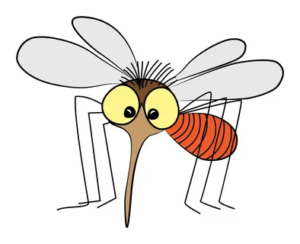
Symptoms caused by mosquito bite
A mosquito bite is a minor skin reaction that occurs when a female mosquito inserts its stinging organ into the skin of a human or animal to suck blood. Mosquitoes need blood to develop their eggs. During the bite, the mosquito secretes saliva containing anticoagulants and other substances to make it easier to suck the blood.
This mosquito bite often results in a small, raised, itchy bump on the skin. The reaction can vary from person to person, with some people experiencing only mild itching and redness, while others may have stronger reactions such as severe itching, swelling and redness. In some cases, a mosquito bite can also lead to allergic reactions.
The itching and irritation associated with mosquito bites are usually temporary and disappear on their own after a few days. However, scratching the bite can lead to a worsening of symptoms and possibly secondary infections.
Preventing mosquito bites
To prevent mosquito bites, you can take some steps to protect yourself:
- Wear protective clothing: Try to wear long sleeves, long pants and socks, especially if you are outside during dusk and night, when mosquitoes are more active.
- Use insect repellent: Apply insect repellent to exposed skin area. Choose a product with ingredients as lemon eucalyptus oil. Follow the instructions on the packaging.
- Avoid perfumes and strong-smelling products: Fragrant lotions, soaps and perfumes can attract mosquitoes. Try to avoid these when you are outside.
- Keep mosquitoes out: Use screens on windows and doors to keep mosquitoes out.
- Avoid stagnant water: Mosquitoes lay their eggs in stagnant water. Make sure there is no standing water nearby, such as in open containers, flower pots and watering cans.
- Ventilation and air conditioning: Mosquitoes are attracted to heat and moisture. Keep your home cool and well ventilated, preferably with closed windows and doors or using air conditioning.
- Avoid being outdoors during peak times: Mosquitoes are especially active during early morning and dusk. Try to stay indoors during these periods or take extra precautions.
- Choosing travel destinations: If you are traveling to areas where mosquitoes are carriers of a disease, such as malaria or dengue, inquire about specific recommendations and measures for protection.
- Use mosquito nets: If you stay in an area with a lot of mosquitoes, use mosquito nets to protect your sleeping area.
By taking these precautions, you can significantly reduce the chance of mosquito bites and protect yourself from discomfort and potential mosquito-borne diseases.
Natural relief for complaints caused by mosquito bites
Mosquito bites can cause unpleasant symptoms, such as itching, pain and redness. Fortunately, there are some natural ways to ease these discomforts:
- Vinegar: Moisten a cotton pad with vinegar and place it on the area for a few minutes to reduce itching and pain.
- Cold compresses: Place a clean washcloth or ice pack on the bitten area for about 10-15 minutes. This can reduce swelling and provide temporary relief from itching and pain.
- Aloe vera gel: Aloe vera is known for its soothing properties. Apply a small amount of pure Aloe vera gel to the bites. This can help reduce itching and soothe the skin.
- Honey: Honey has natural antibacterial and anti-inflammatory properties. Apply a thin layer of honey to the bite and let it sit for some time before gently rinsing it off.
- Tea tree oil: Tea tree oil has antiseptic properties and can help reduce itching. Mix a few drops of tea tree oil with a carrier oil, such as coconut oil, and apply to the bites.
- Oatmeal: Oatmeal can have a soothing effect on the skin. Add finely ground oatmeal to a warm bath and soak for 15-20 minutes.
- Coconut oil: Coconut oil can moisturize the skin and help reduce itching. Apply a thin layer of coconut oil to the bites.
- Chamomile tea: Chamomile has anti-inflammatory properties. Soak chamomile tea bags in warm water, squeeze them and place them on the bites.
- Soda (sodium bicarbonate) also called baking powder: Mix soda with a little water to form a paste and apply to the bites. Allow it to dry for some time before rinsing it off gently.
While these natural remedies can provide relief, it’s important to know that everyone reacts differently. If symptoms persist, worsen, or are accompanied by other symptoms, consult a medical professional.